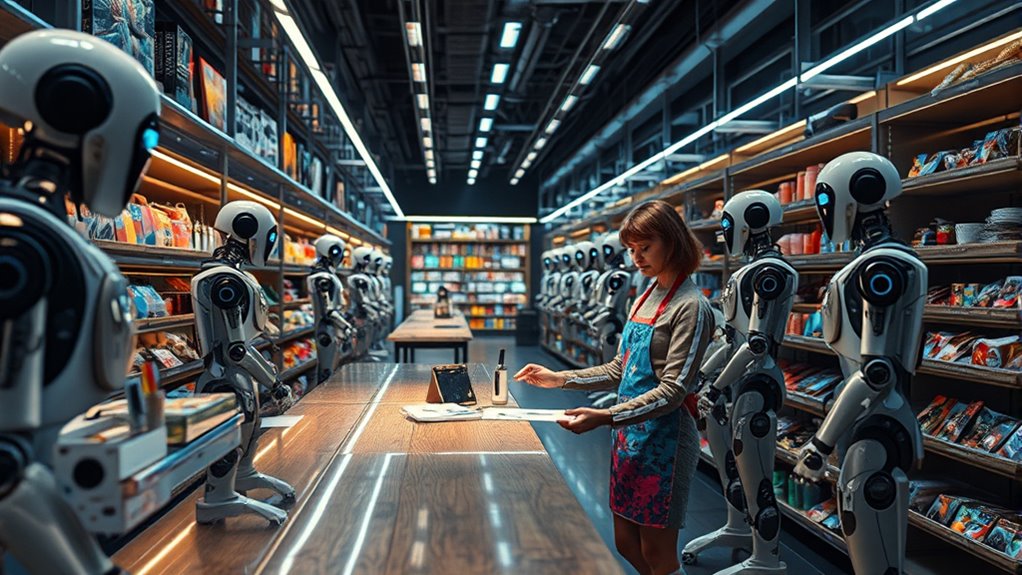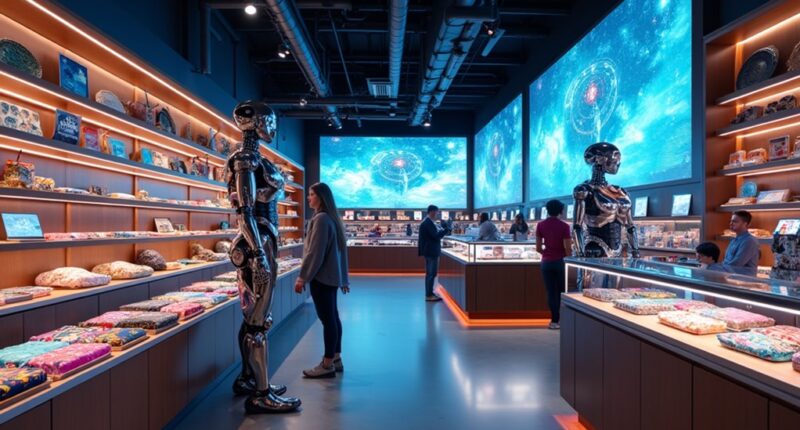AI is transforming stores with automation and personalized shopping experiences, but human creativity still plays a vital role. You can leverage AI for efficiency and tailored offerings, yet genuine emotional connections and innovative storytelling require your unique touch. As technology advances, your creativity is what sets you apart in a competitive market. Want to explore how to keep your human touch relevant in this AI-driven world? Keep exploring to discover more.
Key Takeaways
- AI automates routine tasks, freeing human staff to focus on creative and strategic customer engagement.
- Human creativity is essential for storytelling and emotional branding that AI cannot replicate.
- Retailers see AI as a tool to enhance, not replace, human roles in delivering personalized experiences.
- Ethical considerations ensure AI deployment supports human-centric values and maintains customer trust.
- Continuous innovation by humans drives differentiation in a competitive retail landscape despite AI advancements.

As AI becomes increasingly integrated into retail, it’s transforming the way stores operate and engage customers. You’re likely noticing more personalized shopping experiences, smarter inventory management, and automated services that streamline your journey. In 2024, a striking 78% of retail organizations adopted AI, a significant jump from just 55% the year before. Almost all retailers worldwide are now exploring or using AI in some capacity—only about 1% haven’t begun evaluating its potential. Retailers are investing heavily in these technologies, with 85% of executives developing AI capabilities and 60% actively expanding them. Marketers are using AI for a variety of applications, with 92% employing it by 2025, to craft tailored offers, enhance customer engagement, and optimize marketing strategies. The retail automation market is projected to grow from $27.2 billion in 2024 to over $74 billion by 2035, underscoring the importance companies place on AI-driven efficiency.
AI’s impact on customer experience is profound. It enables hyper-personalization, which means you receive tailored recommendations and interactions based on your preferences and browsing behavior. Chatbots and autonomous shopping agents are increasingly common, making your online visits more engaging and accessible around the clock. Real-time decision-making allows stores to offer seamless, personalized journeys, reducing friction and increasing satisfaction. Visual search tools help you find products faster by simply uploading images, while predictive analytics forecast your preferences and enable brands to craft targeted marketing campaigns that resonate with you personally. Deep learning algorithms are at the core of many AI tools, continuously improving their accuracy and relevance based on vast amounts of data. Furthermore, utilizing vertical storage solutions can enhance the overall efficiency of retail spaces, ensuring that products are easily accessible and organized. Operationally, AI enhances supply chain resilience and optimizes inventory management, reducing stockouts and excess stock. It supports smarter store operations and cuts labor costs through automation, allowing staff to focus on more meaningful customer interactions. Real-time predictive analytics help retailers adjust their stock levels proactively, matching supply with fluctuating demand. As a result, your shopping experience becomes more consistent and reliable, whether online or in physical stores.
Investments in AI continue to rise, with 55% of U.S. retail marketers planning to increase their AI budgets in 2025 to boost engagement. Over half of retail executives expect to expand AI investments over the next few years, mainly targeting campaign automation, performance optimization, and personalized experiences. These investments are viewed as essential for staying competitive in an increasingly digital landscape driven by e-commerce and changing consumer habits. Despite AI’s growing prominence, human creativity remains crucial. Only 39% of marketers use AI to develop new customer experiences beyond optimization, emphasizing that strategic innovation and emotional connection still depend on human insight. Creativity drives differentiation, especially in crowded markets where AI tools can’t fully replicate genuine brand storytelling or cultural nuance. Retailers recognize that AI should augment, not replace, human roles. The future lies in blending AI automation with human ingenuity, fostering a hybrid approach that leverages the strengths of both. Ethical considerations and responsible deployment are critical as retail continues to evolve into an AI-powered yet human-centered space.
Frequently Asked Questions
How Does AI Affect Customer Experience in Retail?
AI transforms your retail experience by delivering personalized recommendations based on your shopping habits, making your interactions more relevant and satisfying. It enables targeted promotions, dynamic product suggestions, and faster customer support through chatbots, enhancing your overall satisfaction. With real-time data optimization, your campaigns become more engaging, and inventory management improves product availability. Overall, AI creates a seamless, efficient, and tailored shopping journey that keeps you connected and loyal to your favorite brands.
What Skills Do Humans Need to Stay Competitive?
You need to sharpen your soft skills like a well-honed blade—empathy, communication, and active listening—these are your secret weapons. Cultivate emotional intelligence to navigate unpredictable situations with grace. Embrace continuous learning as your steady compass, guiding you through rapid changes. Develop digital literacy to dance effortlessly with technology. By blending creativity, emotional insight, and adaptability, you’ll stay ahead in the competitive retail landscape, making meaningful connections that AI can’t replicate.
Can AI Truly Replicate Human Creativity?
AI can’t truly replicate human creativity because it lacks genuine insight, emotional depth, and cultural understanding. While AI can generate surprising ideas and combine concepts innovatively, it relies on pattern recognition and data, not personal experience or intentionality. You maintain a creative edge because your ability to connect diverse ideas, incorporate feelings, and adapt contextually remains uniquely human, making your creativity irreplaceable despite AI advancements.
What Ethical Considerations Arise From AI in Stores?
You should consider ethical issues like privacy, fairness, transparency, and accountability when AI is used in stores. Protect customer data with clear policies and get explicit consent. Avoid biases by continuously monitoring AI decisions and ensuring they’re fair. Be transparent about how AI influences pricing or recommendations, and explain decisions to customers. Establish accountability structures to oversee ethical use, handle complaints, and regularly audit systems for compliance and fairness.
How Will Employment in Retail Change Long-Term?
Long-term, your retail employment will shift toward roles that require human creativity, empathy, and complex problem-solving. As AI handles routine tasks, you’ll need to develop skills in managing AI systems, analyzing customer data, and designing personalized experiences. You’ll move from transactional duties to strategic roles, focusing on innovation and customer engagement. Staying adaptable and honing these skills will keep you relevant in an evolving retail landscape increasingly driven by technology.
Conclusion
Even as AI transforms retail, your creativity remains essential. Imagine designing a unique in-store experience that AI can’t replicate—like a boutique using personalized art installations to attract customers. That human touch creates a memorable vibe AI can’t match. So, keep honing your creative skills; they’re what make your store stand out. In this evolving landscape, blending AI efficiency with your originality ensures you stay relevant and irresistible to shoppers.









